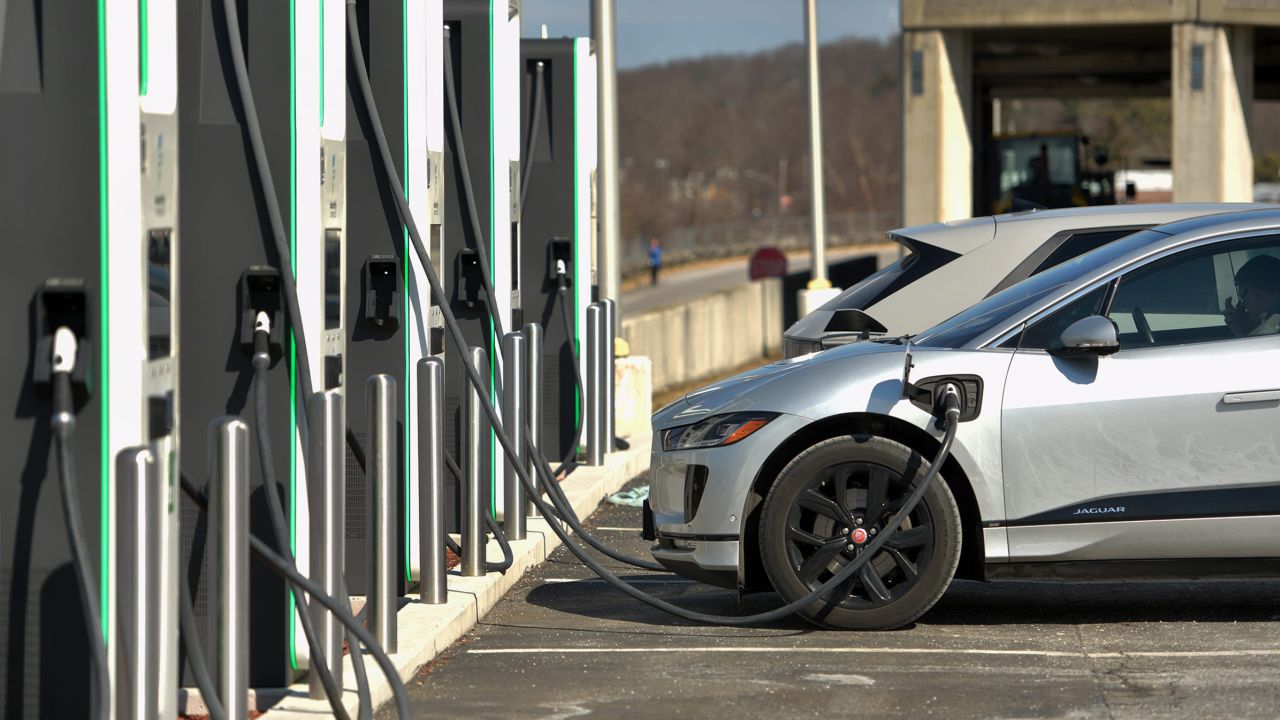CNN
—
The Environmental Protection Agency proposed new car pollution rules on Wednesday that would require electric vehicles to account for two-thirds of new cars sold in the U.S. by 2032. Still.
Tailpipe standards would have the effect of halving planet-warming pollution from cars. According to the EPA, transportation accounts for approximately 30% of all greenhouse gas emissions in the US.
EPA Administrator Michael Reagan called the regulations “stronger federal pollution standards for cars and trucks.”
“Together, these actions will accelerate the current transition to a cleaner vehicle future, tackle the climate crisis and improve our air quality for communities across the country,” Reagan added.
EPA officials said they are considering various emissions proposals that could result in an electric vehicle adoption rate of 64% to 69% by the start of the next decade. If approved, the emissions standards will begin with model year 2027 vehicles.
The new rule anticipates that by the 2032 model year, EVs could make up nearly half of all new medium-duty vehicles, such as delivery trucks. Officials are also proposing stronger standards for heavy vehicles, including dump trucks and public utility vehicles. Trucks, and transport and school buses.
The Biden administration’s proposal is a watershed moment for the U.S. auto industry and consumers, one expert told CNN.
“It’s a big deal,” said Thomas Boylan, a former Environmental Protection Agency official and director of regulation at the Zero Emission Transportation Association, an EV trade group. “It’s really going to set the tone for the rest of this decade and into the 2030s for what this administration expects the auto industry to do when it comes to decarbonization and ultimately electrification.”

Reagan and White House National Climate Adviser Ali Zaidi hailed the proposed regulations as a major climate win that would save American consumers money for years to come.
In the first few years of the Biden administration, the number of EVs on American roads has already tripled, while the number of public charging stations has doubled, Zaidi said. Zaidi promised more to come, with Biden’s infrastructure act funding a network of EV charging stations paired with consumer tax credits.
“Whether you measure today’s announcements in terms of dollars saved, gallons reduced or pollution not pumped into the air, this is a win for the American people,” Zaidi said.
Nevertheless, the administration is writing aggressive regulations to push the market toward EVs The Gallup poll was released Wednesday It says that Americans still aren’t sold on the idea. A Gallup poll of more than 1,000 US adults last month found that 41% said they would not buy an electric vehicle.
Not only are EVs still more expensive than gas-powered cars, but consumers still don’t understand the climate benefits of switching to zero-emission vehicles, the poll found. Six in 10 respondents said they believe EVs do “little” or “not at all” to the environment.
Transportation is the largest source of planet-warming pollution in the United States, and light-duty vehicles — the average car Americans drive — account for 58% of those emissions. The U.N.’s Intergovernmental Panel on Climate Change reported last year that aggressive, pollution-reducing changes in the global transportation sector — including switching to EVs — could reduce the sector’s emissions by more than 80%.
“Tackling the climate crisis means creating opportunity — an opportunity to put America on a clear path to winning 21st century jobs and industries,” Reagan said.
Other countries, including the EU and China, are moving rapidly towards adopting EVs. In the US, California has already proposed making 70% of new car sales zero-emission vehicles by 2030, and 17 other states plan to follow California’s lead.
That means much of the U.S. auto industry will change ahead of the already proposed federal rule.
“I believe it’s very doable,” Marco Oge, president of the International Council on Clean Transportation and a former Obama EPA official, said of the aggressive transition to EVs. “There is business. Europe is ahead of America, China is ahead of Europe – and these companies are global companies.
New federal tax credits are coming next week aimed at helping US consumers save up to $7,500 on an EV. But the auto industry has incredibly complex requirements — including those for cars’ batteries and components that come from the United States or countries with which it has a free trade agreement.
However, Boylan said the regulations are designed to phase in over the next decade, at which point consumers will have more electric vehicle options to choose from.
“You’ve got tax breaks as a carrot,” Boylan said. The proposed tailpipe regulation “provides the stick to prevent these incentives and push the industry forward.”
EPA will take public comment on the proposal before finalizing a rule in the coming months.